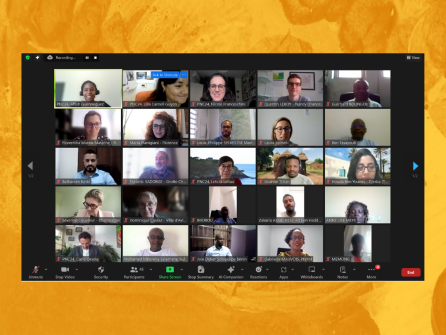In today's world, where cultural and natural heritage sites face unprecedented challenges, the importance of effective management strategies cannot be overstated.
From 18 to 22 March, the international course "Managing World Heritage: People Nature Culture" brought together 39 francophone heritage professionals and site managers from 16 countries across the globe – Benin, Burkina Faso, Cameroon, Central African Republic, Chad, Comoros, Congo, Côte d'Ivoire, France, Haiti, Italy, Madagascar, Mali, Morocco, Romania, and the United Arab Emirates – for a comprehensive exploration of the principles of heritage management.
A great opportunity for French-speaking site managers and heritage professionals from francophone countries across three continents
This is the first French edition of the course, which was previously implemented in English, Spanish, and Arabic. Offering capacity building in multiple languages is important to enhancing the inclusive participation of site managers and heritage professionals worldwide and to facilitating the wide dissemination of knowledge and resources.
Implemented online and organized by the ICCROM-IUCN World Heritage Leadership (WHL) programme, with the support of the Cultural Heritage Administration of Korea (CHA) and the Korea National University of Cultural Heritage (KNUCH), this edition marked a significant milestone in fostering cross-cultural dialogue and knowledge exchange.
Underpinning this course, two resources jointly prepared by UNESCO, ICCROM, ICOMOS and IUCN
Based on the knowledge framework outlined in the forthcoming World Heritage Resource Manual "Managing World Heritage" and the management effectiveness assessment methodology of the Enhancing Our Heritage Toolkit 2.0, participants embarked on a five-day journey discussing and exchanging about key processes of effective heritage site management.
Participants gained invaluable insights into World Heritage management, looking at good examples and place-based and people-centred approaches, covering a spectrum of topics: from understanding heritage places — including the Outstanding Universal Value and other heritage values and attributes —, to analyzing governance arrangements and roles and responsibilities of stakeholders, as well as understanding the legal framework, management planning and monitoring.
Over the coming months, we will work with participants to bring some of the case studies they have prepared for the course on the PANORAMA Nature-Culture platform, to share successful case studies of heritage management actions, projects and programmes.
The next edition of the "Managing World Heritage: People Nature Culture" course will take place online in English from 22 to 26 April. Stay tuned for updates!

